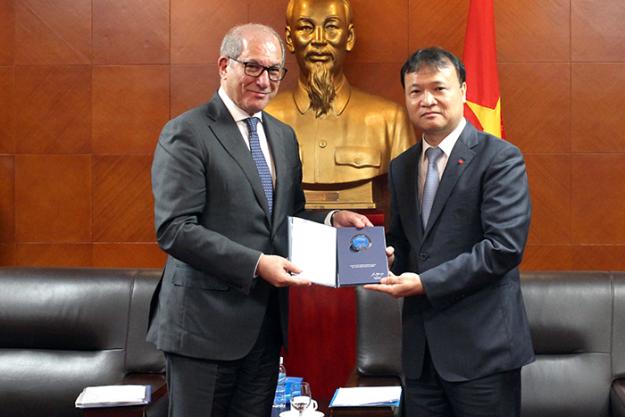
The OPCW Director-General, Ambassador Ahmet Üzümcü, meeting senior Vietnamese officials during a visit to Hanoi
THE HAGUE, Netherlands — 14 May 2018 — The Director-General of the Organisation for the Prohibition of Chemical Weapons (OPCW), Ambassador Ahmet Üzümcü, met with senior Vietnamese officials during a visit to Hanoi from 6-10 May 2018. Director General also attended and delivered a key-note address at an International Conference on Science for Development in the city of Quy Nhon, which was co-sponsored by Vietnam and France as well as UNESCO, CERN and the Solvay Institute and attended by scientists and development experts from around the world.
During his visit, Ambassador Üzümcü met with Vietnam’s Deputy Minister of Trade and Industry and Head of the National Authority, H.E. Mr Do Thang Hai and the Deputy Minister of Foreign Affairs, H.E. Mr Ha Kim Ngoc.
The Director-General also visited the Chemical Command laboratory at Vietnam’s Ministry of Defence.
At the Conference on Science for Development, the Director-General highlighted the work OPCW does with governments, industry, and the scientific community to promote the peaceful application of science and technology and to provide tools for sustainable growth.
He emphasised the role of scientists in upholding the global norm against chemical weapons and addressed the need for vigilance involving a range of measures and mechanisms to ensure chemical security at every stage of a chemical’s life cycle.
The Director-General stated: “The OPCW will continue to rely on the steadfast commitment of all our partners, including the scientific community, to promote and uphold the tenets and spirit of the convention .”
Background
Vietnam joined the Chemical Weapons Convention in 1998 and has been an active supporter of the Convention and OPCW’s activities throughout the years.
The conference on “Science for Development” was a follow-up to the 2016 international conference on “Fundamental Science and Society”, and discussed the role science, technology, and innovation play in implementing the 2030 Agenda for Sustainable Development. The conference was held at the International Centre for Interdisciplinary Science and Education (ICISE) in Quy Nhơn, Bình Định Province.
The OPCW has conducted two Technical Assessment Visits (TAV) to Vietnam. In May 2015, OPCW representatives attended a UNICRI workshop on the CBRN National Action Plan in Ha Noi. The workshop provided expert advice to establish the National CBRN teams and to draft National Action Plans Regarding Risk Mitigation and Security Governance.
In March 2009, at the request of the National Authority, a TAV to Vietnam was made to assist Vietnam improve its national CW response capacity. As a follow-up to the TAV, a basic protection course for first responders took place in Hanoi in September 2010.
As the implementing body for the Chemical Weapons Convention, the OPCW oversees the global endeavour to permanently eliminate chemical weapons. Since the Convention’s entry into force in 1997 – with its 192 States Parties – it is the most successful disarmament treaty eliminating an entire class of weapons of mass destruction.
Over 96% of all chemical weapon stockpiles declared by possessor States have been destroyed under OPCW verification. For its extensive efforts in eliminating chemical weapons, the OPCW received the 2013 Nobel Prize for Peace.
